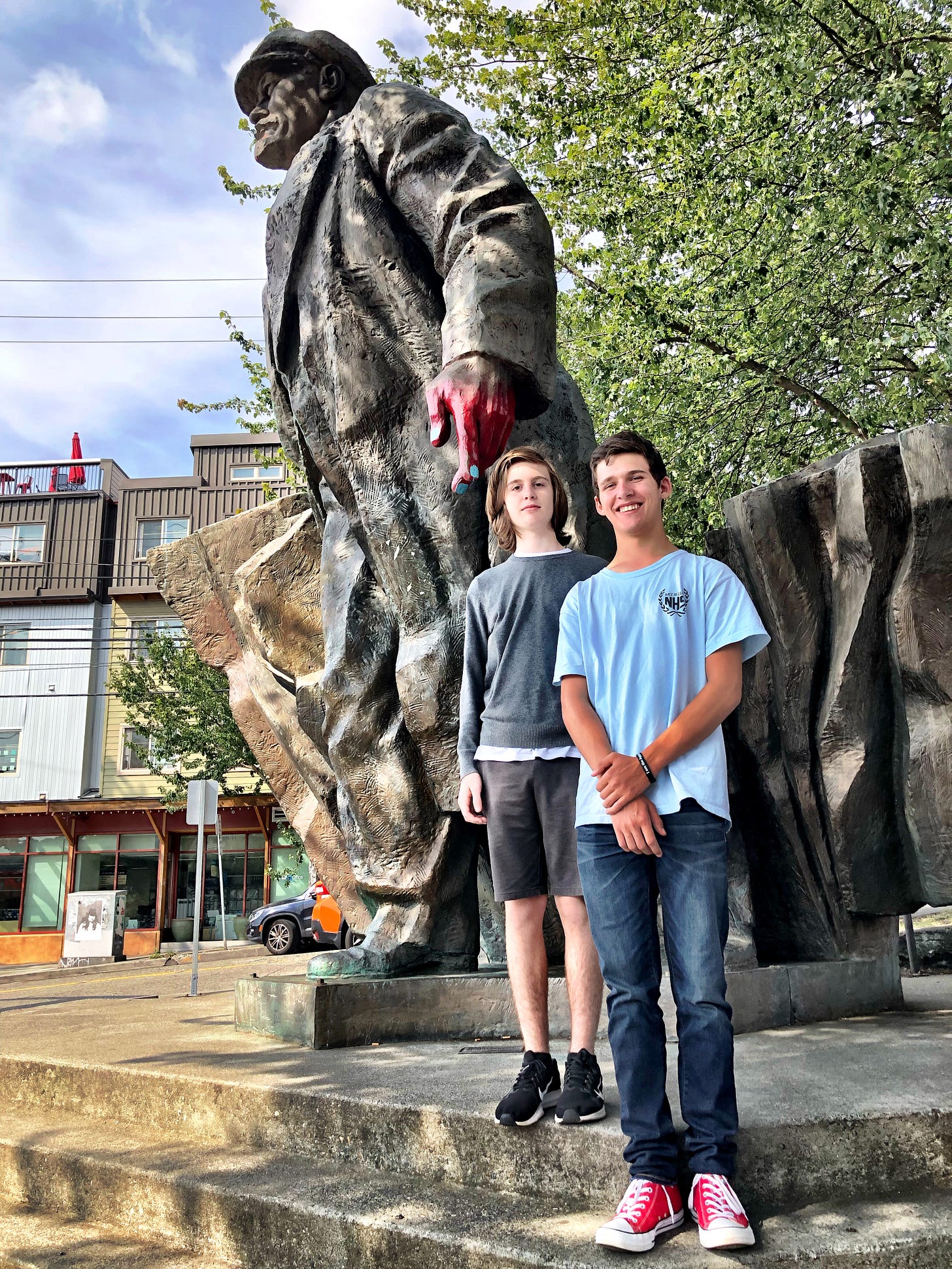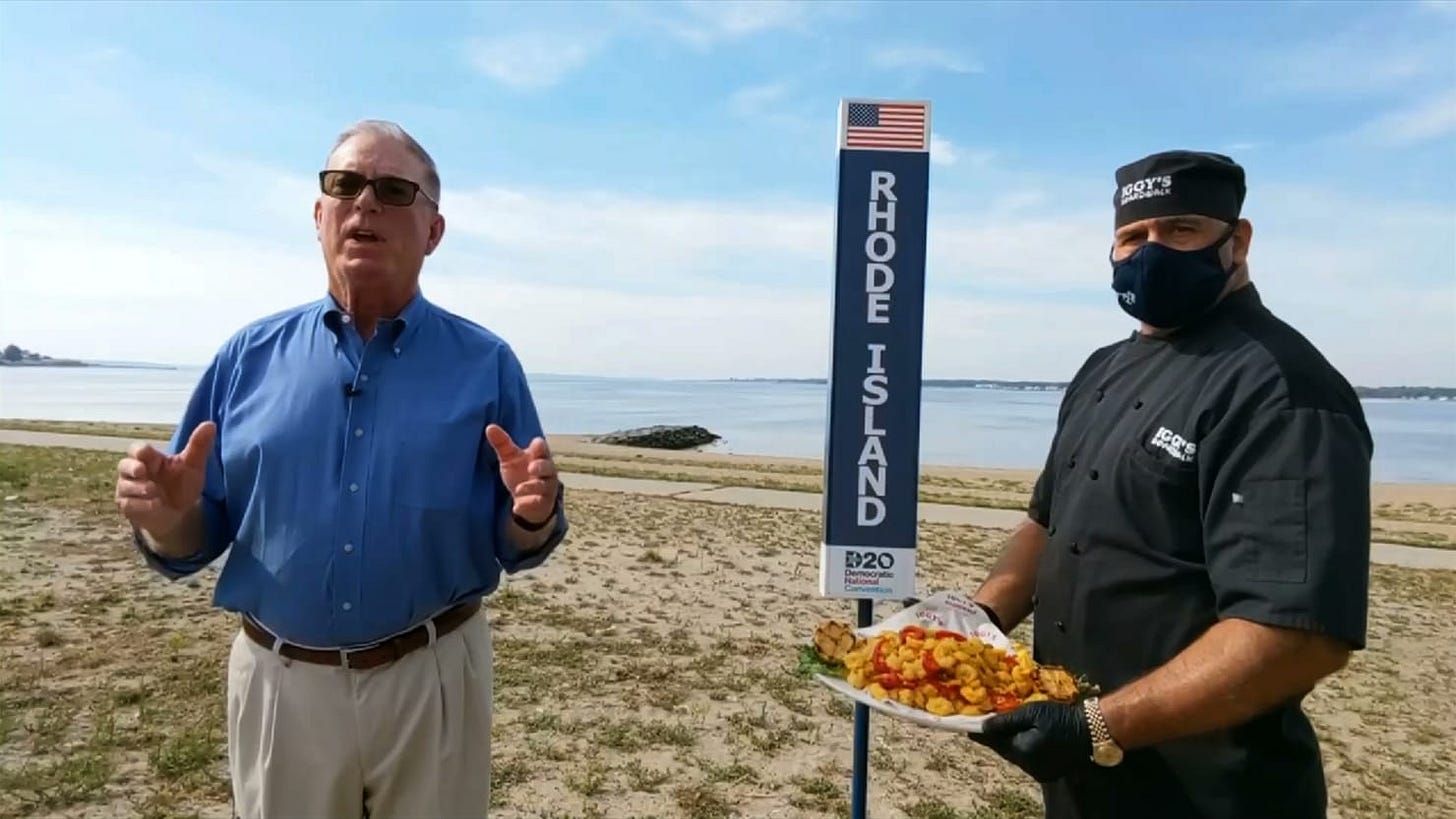Memory
We think the statues are history. They're not. The choices we make are.
Kids, do you like fun, because this edition of The Experiment is two tote bags full of it. Oh, I’m so excited to share this with you. We start with Jack Hughes, who has divined that Dan Quayle is the secret mastermind behind Mike Pence’s unlikely ascent in “The Unusual Suspect” before sliding sideways into Monte Williams, who takes us through the looking glass experience of living inside a box on constant video calls. Reader, I give you “The Quadrangularity, Part 1.” Then Jessie Daniels makes her debut here by seeding the states in “Roll Call Bracketology.” Jamie Tinsley, who wrote movingly last April of having to face the pandemic as a widowed mother of two school-age daughters, is back to tell us what it’s like when hurricane season and back-to-school happen during a pandemic when you’re still grieving in “Booze. Hurricane Kit. Anxiety.” And of course we’ve got the latest installment of Robin Whetstone’s memoir; this week in “Red Ticket,” she visits a cat circus.
To that embarrassment of riches we add three things I’ve done: an article for Texas Highways about Walker Lukens’ Song Confessional, an interview I did for “Storey Time,” and a Super PAC I’m helping that wants to help Joe Biden win Texas.
And as always, we remember who we’ve lost and offer recommendations on what to do, read, watch, and listen to, including a game of “exquisite corpse” pulled off by Mobley. Don’t know what that means? Scroll down to the bottom. It’s a clever way for artists to collaborate in quarantine.
But first, did I ever tell you how confusing it is to me when smart people, well, aren’t?

My mom tells this story of a cookout where they brought hamburger patties that had been frozen too long, a fact they only discovered after going to all the trouble of packing coolers, finding a place to have a picnic overlooking the Straits of Juan de Fuca, starting the fire, grilling the meat, and assembling the burgers. One bite, and my mom knew the meal was inedible, but there was one kid, a boy she was looking after as a favor to a friend that day, who ate nearly his whole burger until he stopped, confused.
“Why isn’t this good?” he asked.
We’re all a little like that, or at least I am, charging ahead with expectations coloring our perceptions of things, only later realizing we don’t actually like fennel even though it’s right there in the recipe for beef stew, which you love, or that we actually like bebop despite a lifetime of avowedly not being a Jazz Person, or that the reason you manically eat baby carrots at parties is that social gatherings make you anxious. You go into a thing expecting a middle C but experience a C sharp above; until you bring your awareness in line with reality, you experience dissonance, a psychic misalignment. And until you pull that C sharp up into a G, turning the minor second into a major fifth, you experience pain.
That’s what happens to me when smart people I respect say things that don’t make sense. By training, upbringing, and disposition, I have faith in those who earn it, and if I judge someone as smart, learned, and of good judgment, I will not question their views lightly, if at all. To find myself out of alignment with their views causes me such pain in my gut that it feels more like guilt.
This is, of course, rank lunacy.
Few would begrudge me a different opinion. I doubt anyone takes my disagreement personally or even seriously. I stand before you fully aware of my foolishness. The subject is Confederate monuments. Some people have said some stuff. I have no illusions that I will persuade these people of my rightness while they sit there in their wrongness, being wrong. What follows is an act of statuary Tourette’s, a necessary venting to prevent me from getting stomach cancer because I cannot abide the unacknowledged misalignment.
The subject is Confederate monuments. Some people have said some stuff.
I will not name these people. I do not wish to provoke a conversation, much less a quarrel. But reader, know this: They are among you, receiving The Experiment every Saturday morning, and I hold each of them dear in my heart, which is why I have written, rewritten, deleted, and finally written several hundred words to get here. To them I promise continued goodwill and assumed best intentions.
I dally, loathe to conflict I have become in late middle age. But things were said.
To wit:
“I’ve never agreed with the idea that we should expunge the Confederacy from all American history so that no one would ever see anything about it, so no one would ever know. I don’t see why that is a good idea. Whatever lessons there may have been to be learned are not going to be learned if you if you don’t see a marker or something somewhere.”
“Which one’s more egregious, owning slaves or financing and equipping voyages to the Middle Passage?”
“At some point you’re gonna be taking down the Washington Monument and the Jefferson Memorial.”
“Removing statues is censorship.”
Debunking each of those statements would be a poor expenditure of your time if they were said by a Confederate re-enactor, Nazi sympathizer, or President of the United States. (And yes, we’re all thinking the same hacky joke here, so let’s move on, shall we?) But intelligent, well-read, and good people said them. Out loud. Where children could stumble upon their words and not know that something can make logical sense and still end up causing rhetorical mayhem.
In order, no one is saying we should expunge “the Confederacy from all American history,” and if we got rid of every single Confederate plaque, statue, memorial, marker, and flag, we not run the slightest danger that “no one would ever know” as long as state legislatures require instruction in U.S. history and as long as documentaries and books have platforms and audiences. I don’t know who learns history from a statue, and that’s not the point of them anyway. They are selective memories, what we as a society choose to hold onto and literally look up to because the people or ideas they represent are thought to have merit. A statue confers honor on its subject and expects you to do the same. A statue is a social contract.
I’m starting to feel better. I know you were worried, though probably more about my head than the guilty knot in my stomach.
Next, the selectivity argument which holds that if you take down a statue of Robert E. Lee because of his leading military role in defending slavery, then you have to take down the statues of and remove the names from buildings of Northerners who profited from the slave trade, to which I say: cool, whatever. If you want to boycott New York Life because they once insured enslaved people, knock yourself out. Want to rename a building at a university because some old dude was a wee bit of a stickler for segregation at that school? Can’t see any harm done.
The bigger problem I have with the selectivity argument is the fallacy that underpins it and is best exemplified by the slippery slope prediction that next thing you know, we’ll be taking down the Jefferson Memorial because of Sally Hemings. This is a terrific example of how something can be perfectly logical and make no sense at the same time, because it is perfectly within a person or a government’s ability to apply values to similar situations and make different choices based on their best judgment.
Want an example? I was hoping you’d ask. After the Unite the Right neo-Nazi both-sides-a-thon in 2017, people in Austin started defacing a street sign for Robert E. Lee Road, which is how the city council got the idea to rename streets named for Confederate officers. This raised a lot of questions, such as how many streets are named for heroes of the Confederacy in Austin, and what about the government buildings and schools and bodies of water and are we only talking about Confederate officers? What about Jim Crow-era bastards with white supremacist filling? So the council, as it should have, kicked those questions to the Equity Office, which returned with a report of all the things named after white supremacists, including one leader of the Texas Revolution, Stephen F. Austin. For days, clickbaity headlines caterwauled that Austin was thinking about changing its name.
It wasn’t, didn’t, and won’t. In the end, the super liberal city council only renamed Robert E. Lee Road and Jeff Davis Avenue, feeling no obligation to eschew good judgment in favor of thoughtless ideological consistency because, in this case, doing the logical thing would have also been the most extreme case of thundering dunderheadedness in the history of a city where examples abound. One thing — renaming two streets — did not inevitably lead to renaming Austin. The slippery slope is a rhetorical construct, not a metaphor describing human behavior.
Finally, we have the argument that taking down a statue is state censorship. There are some obvious, superficial reasons this is wrong: A government body modifying how it expresses something, whether a historical interpretation, the name of something, or even something as simple as not answering a question, is not censorship.
Government forbidding you to express an opinion is censorship, and no one is telling anyone that they can’t put up Confederate statues on their own land or teach in private and parochial schools that the Civil War was caused by South Carolina’s Hat Tax, which is a thing a Civil War re-enactor once tried to tell me. Reader, I mocked him like a journalist once taught me: I wrote it down, and now I’m telling you.
If the government chooses one thing it does not follow that every other option has been censored. Historical interpretation, which is part of the government’s job in naming streets or army bases, choosing statues, and approving curriculum standards, just to name a few examples, is not censorship just because the government chose one thing and not the other. Otherwise, every time the Mayor of Austin referred to the name of our fair city he would be guilty of censorship because this place used to be called Waterloo. Renaming the city was simply a political choice, and that’s where this gets more interesting.
Changing the name of Saint Petersburg to Leningrad and then back to Saint Petersburg was only censorship if the Soviet Union made it a crime to call the city Saint Petersburg when it was Leningrad, which they probably did, but that only proves my point.
The first thing that happens after a repressive regime is toppled is they pull down the statues of the sausage-brained hoodlums who had been censoring history to begin with. In fact, tearing down statues of undemocratic rulers is part of our history as well.
The most dramatic act took place in New York City on July 9, 1776. Early that evening, General George Washington and his troops, along with hundreds of citizens, crowded into what is now City Hall Park to hear a reading of the document that had just arrived from Philadelphia. The enthusiastic throng then headed for Broadway and the two-ton equestrian statue of King George III on Bowling Green.
As far as I can tell, pulling down the statue of King George has made no one forget that we fought a war against England for our independence. See also: Hamilton.
What usually gets lost in conversations about taking down Confederate monuments is why they were put up in the first place — not to remember history, but to rewrite it. Most of them went up in the Jim Crow era in an effort, some say, to intimidate the Black population, though I think state-sponsored violence and the Klan probably had more to do with that than a statue of Robert E. Lee in the town square. (Fun fact: Lee opposed putting up statues of Confederate generals, calling it “wiser moreover not to keep open the sores of war, but to follow the examples of those nations who endeavored to obliterate the marks of civil strife and commit to oblivion the feelings it engendered.”)


Why they really put up those statues of Confederate Leaders was to tell a lie, that the South seceded to preserve their honor, not their human chattel, a well-established fact among historians, including UCLA’s Dell Upton, a historian of architecture.
The inscription reads in part, “This monument . . . marks the spot where the military force of the United States of America finally triumphed and established as inviolate the principle of an indissoluble union. It marks also the spot of the last stand of the Confederacy in maintaining its ideal of indestructible states—an ideal which[,] preserved to the American union by virtue of the heroic fight[,] grows in strength from year to year.” Claims that “state sovereignty” or “states’ rights” were causes of the Civil War were after-the-fact interpretations intended to paper over the central role of race. The original ordinances of secession explicitly stated that the Confederacy was formed to defend slavery and white supremacy.
I knew none of this until people started talking about taking down Confederate statues after Charlottesville. Let me say that more plainly: I have learned history because we are taking down statues and renaming streets. By the way, those streets in Austin were renamed for an Austinite who was the first and only black U.S. treasurer and a Reconstruction-era Black elected official who founded a school for the blind that still exists today. I had never known they existed until they came for Jeff Davis and General Lee.
It’s wrong to say you can’t learn history from a statue, and I hope I have not given you that impression. A statue is a historical record of itself, not of what it portrays. A statue is a physical record of a choice that someone made in our history, as is an empty plinth. Sometimes taking down statues is the only way to know the history of why they were put there to begin with, a point better made recently by a better writer, Stephen Harrigan, who gets the last word:
[B]ronze is not an immutable metal after all. It can’t stand up to the erosion of old values or the rise of new ones. Just like everything else, it has an expiration date. … [Y]ou can’t erase history. But you can melt bronze at 1,742 degrees Fahrenheit. You can break a statue into pieces, remove it, erect it somewhere else, replace it with something or someone more palatable to its time. That process is history too.
The Unusual Suspect
by Jack Hughes
Jack Hughes, our correspondent from on high, our Canadian sensation, our pop culture vulture, checks in with a horrifyingly compelling theory about why Donald Trump did not replace Indiana’s Mike Pence as his running mate.

I was not only 100% sure he would pick someone new I was 100% sure he’d opt for the oft-touted former UN Ambassador and South Carolina Governor Nikki Haley.
In the end, though, I was 100% wrong. Then I realized Nikki Haley and Nelson Rockefeller were red herrings – the missing puzzle piece was Dan Quayle.
The Quadrangularity, Part 1
by Monte Williams
My old friend Monte Williams, who showed up in June with “Content for Jason” and returned this month with “Publish or Perish,” is back with the first in what he promises is a series in his singular mad scientist comic way.

We now live in a world straight from Huxley, a Boxed New World. I have named this existence. I call it The Quadrangularity. Oh wait, I mean I call it The Quadrangularity®.
Roll Call Bracketology
by Jessie Daniels
Jessie Daniels is a policy professional and writer based in New York. Daniels previously worked in the U.S. Senate as a national security legislative aide to Majority Leader Harry Reid. Daniels writes frequently on foreign policy and political issues. Her writing has been published in outlets including The Guardian, The Orlando Sentinel, and The San Francisco Chronicle. Today she makes her debut in The Experiment by seeding the states. If we can’t have March Madness, we can have Roll Call Bracketology.

#9 Vermont
A bunch of rule followers standing six-feet apart or gritty zone defense? They may want to give you free healthcare and college tuition, but they're stingy on points.
Booze. Hurricane Kit. Anxiety.
by Jamie Tinsley

My colleague Jamie Tinsley, who wrote movingly last April of having lost her husband and now having to face the pandemic as a widowed mother of two school-age daughters, is back to tell us what it’s like when hurricane season and back-to-school happen during a pandemic when you’re still grieving. Surprisingly, it’s starting to feel normal again.
It is not normal to spend this much time with your children. Mine say mom 752 times a day. My youngest has resorted to calling me Jamie because I’ve stopped responding to mom.
Red Ticket: Cat and Mouse
by Robin Whetstone

Every weekend we serialize Red Ticket, Robin Whetstone’s memoir of her time in Moscow in the early ‘90s. Today, she covers a cat circus.
It was becoming clear that my compulsion to storify everything was causing me to do things that I knew were risky.
A Confession
by Jason Stanford

Last week I went on, at some length, about my right ankle:
I would wager the entirety of my savings that I have the only ankle in existence that has had a hiphop song and a pop song written about it. If you want to hear me tell the long version of the story about how I broke it, click here.
I told that story to my friend Walker Lukens, the author and performer of one of my favorite songs in the history of music, “Don’t Wanna Be Lonely (Don’t Wanna Leave You Alone).” This song is a perfect confection.
He and his drummer, Zac Catanzaro, bought a trailer and turned it into the Song Confessional. You go into a confessional booth and tell your story; a musician takes your confession and turns it into a song. I told the story of my right ankle once to Riders Against the Storm, and “OverUnder” resulted.
When they turned the Song Confessional into a podcast, Walker took my confession again, this time giving my story to Australian pop singer Holiday Sidewinder; “Another World” provides a new soundtrack to my limping.
All of which is a long way round to say that the Song Confessional and I are in a relationship. I had to tell the story, and Michael Hoinski at Texas Highways kindly commissioned me to tell it, but even knowing what I already did about the Song Confessional, I was ill prepared for the story I discovered.
“The reason that I liked the name was when you go to confessional, you get Hail Marys or something,” Lukens says. “I’m not Catholic. I have no idea. They give you like a sentence.”
“Right,” adds Catanzaro, a former altar boy. “You have prayers and absolution.”
“Yeah, a sentence,” Lukens counters. “I just liked the idea that you went in and you told something, and you got a song out of it. That was the exchange.”
Listen to the podcast episode referenced in the article here.
Listen to Kat Edmunson’s song, “Where I Am,” here.
Read my Texas Highways story here.
Storey Time
hosted by Stephanie Storey
I did an interview about communication in the time of corona with author Stephanie Storey.
I have found that the best way to get the attention of the press is to act like you are not trying to get their attention and to put things where they can discover it.
Turn Texas Blue
The extent of my political work this election cycle is as the treasurer to a Super PAC with one mission: helping Joe Biden win Texas. According to the latest polls, Trump as a small, 3.5% lead in Texas. This is winnable, and if Democrats turn Texas blue…
If you want to help, do these three things:
Donate.
Share that link on your networks.
RIP
How we’re getting through this
Staying married
Looking at animal mummies
Holding concerts to test infections
Virtually marching on Washington, D.C.
Learning how to replace the battery in a key fob
Helping elephants relax by giving them marijuana
Building an airplane on the roof of an apartment building in Mumbai
What I’m reading
Perry Bacon Jr.: “Could A Backlash Against Black Lives Matter Hurt Biden? The Two Don’t Appear Linked So Far.”
Bloomberg: “Don’t Argue With Anti-Mask Shoppers, CDC Guides Retail Employees”
Ryan Holiday: “Welcome to Life. There Are Only Hard Facts and Harder Decisions.”
The country that, for a century, was called to rescue other countries from natural disasters is now the unlikely recipient of pity from New Zealand, Italy and Denmark. People love to talk about American exceptionalism—well, we are being exceptionally stupid.
Sally Jenkins: “Daniel Snyder has now embarrassed — and exposed — the entire NFL”
Jeff Nussbaum and Kate Childs Graham: “The Zoom era has radically transformed political speechcraft. For the better.”
Pop Sugar: “Author on Reading His Book About a 100-Year-Old Runner to His Kids: "This Is Why Representation Matters”
John Phillip Santos: “The Secret History of the Texas Rangers”
Mattathias Schwartz: “The Axios Interview Showed Us an Important Threshold for the President”
Jerry Seinfeld: “So You Think New York Is ‘Dead’”
You found a place in Florida? Fine. We know the sharp focus and restless, resilient creative spirit that Florida is all about. You think Rome is going away too? London? Tokyo? The East Village?
Brittani Sonnenberg: “Sit, Stay, Wait: What Training a Puppy Taught Me About Pandemic Life”
Margaret Sullivan: “How not to apologize when your publication makes a mistake”
WaPo: “How our brains numb us to covid-19’s risks — and what we can do about it”
Dan Zak: “The gun-toting McCloskeys said they feared death. They survived to fight the culture wars.”
By invoking Cori Bush, though, their remarks described a functioning democracy — albeit one with a strong sense of irony. The 1st District of Missouri is reliably Democratic, which means that, come January, the woman brandishing the bullhorn will likely be the McCloskeys’ congresswoman.
What I’m watching
Alex Winter, the Bill in the Bill and Ted movies, has made himself a helluva documentary about child stars called Showbiz Kids. You can find it on HBO, which we accessed through Amazon Prime. Linda Holmes of NPR reviewed it favorably. It’s sad, lovely work.
Helena Andrews-Dyer ranked the best bad dance movies in the Washington Post and included — let us pause before impact, reader, not to savor, but to preserve innocence a mite longer — Magic Mike not only as a good bad movie but as one entry. The original was a dark, Steven Soderbergh-directed film based somewhat on Channing Tatum’s experience as an exotic dancer. The sequel, I will maintain loudly and at length, is a bright, sex-positive detoxification of American manhood. Grouping them together is madness of the first order. Someday, if I’m stuck for anything else to write, I’ll do a scene-by-scene disquisition about the feminist source coding in Magic Mike XXL, but right now all I want to tell you is that Netflix’s Work It did, in fact, belong on the list and was a lot of fun.
What I’m listening to
My rock star cousin George Stanford dropped a new track, “Nobody Controls the Truth.” His vibe is very Sunday afternoon at home. Check it out.
Everyone who didn’t tell me about that dog. is in detention. How did this band get caught in my spam filter? I mainlined Liz Phair, felt the Breeders in my bones, but never picked up that dog.’s trail? Honestly, I’m disappointed in all of you.
As long as we’re talking about women who write clever pop songs that make you bounce in your chair, Blu DeTiger’s “Figure it Out” is a mood.
This Spring, Mobley, an Austin-based artist I’m fond of, had nothing to do but an abundance of creative energy.
He hit on the idea of recruiting other Austin musicians and filmmakers for an album-length game of “exquisite corpse,” the 1920s-era parlor game in which an artist begins a drawing on a piece of paper before folding it over and passing it to another, who picks up on the small fragment of the work that’s left visible, adding his or her own creation and passing it along again to another artist. …
He pulled together a bunch of local and national artists for Deezie Brown, Walker Lukens, and TaSzlin Muerte of BLXPLTN—and some high-profile acquaintances, such as Shakey Graves and Kelsey Wilson of Wild Child and Sir Woman.
The result, Unfamiliar at Home, is a visual album that would not have existed but for the pandemic. We will have new art because we’re quarantining artists and denying them stages. Hat tip to Jeff Solomon for his terrific piece in Texas Monthly about what he calls “a snapshot of a music scene seeking a new way forward.” You’re going to hear me talk about this more as we muddle through this epoch of uncertainty: collaboration, not competition, will save us.
What do you think of today's email? I'd love to hear your thoughts, questions and feedback. I might even put ‘em in the newsletter if I don’t steal it outright.
Enjoying this newsletter? Forward to a friend! They can sign up here. Unless of course you were forwarded this email, in which case you should…
Want a way to send gifts and support local restaurants? Goldbelly’s got you hooked up.
I used this to order scotch delivered right to my door. Recommend.
Thanks to Noom I am down to my college weight, and haven’t had to cut out any foods. I hit my goal weight in May and have stayed within a few pounds either way ever since. This is easy. Noom is an app that uses psychology, calorie counting, and measuring activity to change your behavior and the way you think about food. I’m stronger and healthier than I’ve been in years. Click on the blue box to get 20% off.
Want a way to send gifts and support local restaurants? Goldbelly’s got you hooked up.
I now offer personal career coaching sessions through Need Hop.
If this newsletter is of some value to you, consider donating. Honestly, I’m not doing this for the money. I’m writing this newsletter for myself, and for you. And a lot of you are contributing with letters and by suggesting articles for me to post. But some of you have asked for a way to donate money, so I’m posting my Venmo and PayPal information here. I promise to waste every cent you give me on having fun, because writing this newsletter for you is some of the most fun I’ve had. Venmo me at @Jason-Stanford-1, or use this PayPal link.

